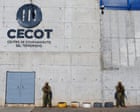
In a world where human rights and social justice remain at the forefront of many international discussions, recent developments highlight ongoing challenges and efforts in various regions. While some nations grapple with policy reform and civil liberties, others strive to ensure that human dignity is protected and upheld.
In El Salvador, a call for accountability and transparency regarding human rights practices at the Cecot prison facility has been made by Congresswoman Delia Ramirez. She is advocating for a congressional investigation into the use of federal funds provided to El Salvador to detain immigrants in a secretive prison. Concerns have been raised about potential human rights abuses within this facility, echoing the importance of international oversight in upholding human decency.
Thousands of miles away, New Zealand’s government faces scrutiny over proposed electoral reforms. Attorney General Judith Collins has expressed concern that these changes might contravene human rights laws and potentially disenfranchise Māori voters. The proposed reforms, which include closing voter enrollment ahead of elections and reinstating a ban on prisoner voting, highlight the delicate balance between governmental reform and safeguarding citizens’ rights. Prime Minister Christopher Luxon has defended the reforms as necessary, yet the dialogue stresses the significance of inclusivity in democratic processes.
Meanwhile, the echoes of free speech and civil protest resonate loudly in Australia. A pro-Palestine group has pledged to take legal action after New South Wales police denied a proposed march across the Sydney Harbour Bridge due to safety concerns. Despite the rejection, law enforcement has expressed willingness to explore alternative avenues for the demonstration. This situation sheds light on the broader global conversation about the right to peaceful assembly and the conditions under which it can be exercised safely.
In another legal sphere in Australia, former SBS newsreader Mary Kostakidis has been embroiled in a legal battle concerning the dissemination of content related to a proscribed terrorist organization. Kostakidis faces accusations under the Racial Discrimination Act for sharing posts about a speech by Hezbollah’s leader. The case brings to the fore the intricate interplay between freedom of expression and anti-discrimination laws.
Turning to Europe, Portugal sees efforts towards addressing housing for students. The Communist Party (PCP) has questioned the government about the potential conversion of public buildings into student residences in Évora. This initiative seeks to utilize existing infrastructure to provide affordable housing, demonstrating a proactive approach to supporting student communities.
These global stories collectively underline ongoing efforts and challenges in the pursuit of human rights and social justice. As nations navigate complex social landscapes, the essence of collaboration and open dialogue remains critical. Through cooperative endeavor and vigilant oversight, the path towards protecting individual rights and fostering inclusive societies becomes more attainable.
Source: {link}
